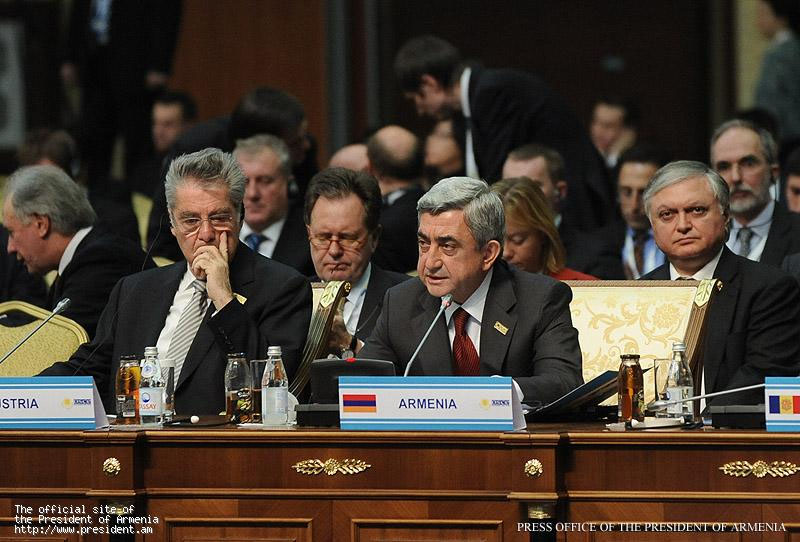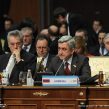
Prospects for Karabakh Peace Recede After OSCE Summit
Publication: Eurasia Daily Monitor Volume: 7 Issue: 224
By:

The prospects for resolving the Karabakh conflict are as uncertain as ever after the inability of Armenia and Azerbaijan’s presidents to reach any tangible agreements on the margins of the Organization for Security and Cooperation in Europe (OSCE) summit in Astana on December 1-2. It marked an apparent failure of the latest international effort to facilitate a Karabakh settlement spearheaded by Russia and President, Dmitry Medvedev, in particular.
Medvedev invested considerable time and energy in the peace process, hosting seven face-to-face meetings between his Armenian and Azerbaijani counterparts since taking office in 2008. Following the most recent of those talks held in Astrakhan, southern Russia on October 27, Medvedev expressed “moderate optimism” that the two sides would make decisive progress towards peace in time for the OSCE summit. That announcement was followed by a new flurry of activity by the Russian, US and French diplomats co-chairing the OSCE’s Minsk Group on Karabakh. Mediators shuttled between Baku and Yerevan in late November after meeting with Russian Foreign Minister, Sergei Lavrov, in Moscow. On November 22, Lavrov had also held a trilateral meeting with his Armenian and Azerbaijani counterparts (Regnum, ITAR-TASS, November 22).
Presidents Serzh Sargsyan of Armenia and Ilham Aliyev of Azerbaijan did not even meet in Astana and only signed a joint statement there with Medvedev, French Prime Minister, Francois Fillon, and US Secretary of State, Hillary Clinton.
According to the statement, the signatories “agreed that the time has come for more decisive efforts to resolve the Karabakh conflict,” adding “They further agreed that a peaceful, negotiated settlement will bring stability and security and is the only way to bring real reconciliation to the peoples of the region.” The statement added that the mediators urged Aliyev and Sargsyan to “focus with renewed energy on the issues that still remain in the Basic Principles” of a peaceful settlement (https://summit2010.osce.org, December 1).
It was a clear indication that the conflicting parties had failed to move further forward in ironing out their disagreements over those principles. Aliyev and Sargsyan made this even more evident by trading bitter recriminations in their speeches during the two-day summit. Aliyev accused the Armenians of committing “war crimes and a genocide” against Karabakh’s Azeri population during the 1991-1994 war and dragging out peace talks since then (APA, December 1).
Sargsyan, for his part, alleged that Azerbaijan had unleashed a “policy of ethnic cleansing and fully-fledged military aggression” against the Karabakh Armenians and has now “no interest” in the conflict’s resolution. More importantly, Sargsyan threatened to formally recognize Karabakh as an independent state if Baku acts on its threats to try to win back the disputed territory and Azerbaijani districts surrounding it by force (Armenian Public Television, December 2). Sargsyan repeated this threat during a December 10 summit in Moscow of the Russian-led Collective Security Treaty Organization (CSTO).
Speaking in the Kazakh capital, Clinton said the mediators and the parties must “renew our efforts toward a settlement in Karabakh” that would be based on six general principles articulated by the US, French and Russian presidents in a joint statement in July 2009 issued after their talks in L’Aquila, Italy (www.armenialiberty.org, December 1). Among those principles are the return of the Armenian-controlled territories around Karabakh to Azerbaijan and an “interim status” for Karabakh itself, which would guarantee its “security and self-governance.” The proposed peace framework also envisages that Karabakh’s final status would be determined through “a legally binding expression of will.”
Crucial details of this formula are contained in the still unpublicized (and repeatedly modified) peace proposals submitted by the Minsk Group co-chairs to the warring sides for the past five years. The parties have disagreed, at various points, on the timetable for Armenian troop withdrawal from the occupied lands, the status of a land corridor between Armenia and Karabakh and the timing of a future referendum on self-determination in Karabakh. The latter issue now appears to be the main area of contention. Baku has insisted, at least until now, that no specific date should be set for the vote. According to one of the classified US State Department documents disclosed by WikiLeaks, Aliyev complained to a visiting top US official in February 2010 that Yerevan wants a referendum date to be fixed in the text of the peace accord. Also, in his public pronouncements, the Azeri leader has repeatedly claimed that Karabakh’s predominantly ethnic Armenian population would only be able to determine the extent of the territory’s autonomy within Azerbaijan in the proposed referendum. The Armenian side denies this, saying that the Minsk Group plan allows for international recognition of Karabakh’s secession from Azerbaijan.
This apparent impasse and other disagreements implies an uncertain future for the Karabakh negotiating process amid what many experts believe is a growing risk of another Armenian-Azeri war. Both Russia and Western powers continue to voice strong opposition to a military solution to the dispute, which is increasingly threatened by Aliyev. The latter regularly points to his government’s soaring defense spending, due to reach a new record high of $3.1 billion in 2011, compared with only $405 million budgeted for Armenia’s armed forces.
Armenia will continue to seek to offset the Azeri military build-up by using its military alliance with Russia, which it upgraded earlier this year. A new defense pact signed by the two nations in late August commits Moscow to supplying its South Caucasus ally with “modern and compatible weaponry and special military hardware.” Both Yerevan and Karabakh’s ethnic Armenian leadership now seem to regard renewed war as a real possibility.
The Karabakh Armenian army held in mid-November what it described as its largest ever military exercise just several kilometers away from Azeri army positions east of Karabakh. A uniform-clad Sargsyan, who watched the maneuvers with his senior army generals, used the occasion to warn that Baku will be dealt a “devastating and final” blow if it resorts to military action (www.news.am, November 14).




